Initiating Change: An Interview with James Swan, Wildlife Conservationist, Author & TV Producer
Agnieszka Spieszny 08.02.11

James Swan is a busy man. The Ph.D recipient and former faculty member at a number of American universities has co-or self-written 10 books, been involved in various films and fulfilled numerous roles as a wildlife conservationist. And there’s no stopping him. He’s currently working on three more documentaries and a few books as well as managing his role as co-producer of Wild Justice, one of the most popular reality-TV shows on the National Geographic Channel.
I recently spoke to Swan over the phone about the effect of his work on a number of wildlife problems. Swan is an example of a man who has the drive, knowledge and means of exposing a profound problem to the public eye oftentimes influencing public opinion and subsequently initiating change within the government and other ruling bodies.
His conservation story began with a survey of household air pollution that Swan’s students at the University of Michigan solicited in Detroit, Michigan in 1970. Having found a number of respiratory diseases and property damage caused by poor air quality, Swan’s simple survey eventually helped to improve air quality standards in the Detroit area. Then in the late 80s and early 90s, he and his wife produced five international symposiums titled “spirit of place.” They discussed how architectural design and planning can work with the ancient wisdom about the power each place has that influences peoples’ lives. He received great commendations. Following a symposium in Colorado, the national park service changed its policies about preserving American-Indian sacred places. After a symposium in Japan, home designers began designing quick, low-cost and very durable homes.
One of the the most recent effects of Swan’s work has been his documentary on California game wardens titled Endangered Species: California Fish and Game Wardens. The wardens approached Swan and his son to film a documentary on their plight – an understaffed and disproportionate per capita amount of wardens to residents, a small budget facing more cuts on top of the dangers of the job. Swan told the wardens “yes we will do this, but we don’t want you to come across as victims, we want you to be unrecognized heroes.” For the next two years, Swan traveled around in the air, on land and on boats along with wardens to compile a 66 minute documentary.
The documentary was syndicated by Swan around California and by the game wardens themselves who gave copies to members of senate and the governor’s office. Its impact was immense. It promptly halted the proposed budget cut for the game wardens, created a $5 stamp or sticker for cars to raise money. Once more budget problems were solved, the wardens added 40 positions and now continue to educate and employ more game wardens than they had in years.
“A good documentary can do a lot of good things.”
The documentary sparked Wild Justice, a reality-TV series following game wardens in California that airs on the National Geographic Channel. The day of its premier, the show received a viewership of 3.2 million people nationwide. Now, the profession is not on the fringe threatened by budget cuts. Swan feels they finally got the recognition they deserve.
“[The wardens] have gone from unknown, unrecognized law enforcement officers to not being able to keep up with the number of requests from people to go on ride-alongs or for press interviews for wardens. And they’re just swamped.”
Such is driving force behind much of Swan’s work. To spread awareness of the topics he thinks people maybe aren’t giving proper attention to, or the problems they don’t understand.
Swan has a loaded project list that he’s working on. Among his numerous projects, like a rodeo film in New Mexico, is a feature film with Bob Brown about the Asian carp invasion of the Great Lakes. Interestingly enough, there has never been a movie made about Smokey the Bear so Swan is helping a friend develop the film as well.
To catch Swan’s recent work, check out War in the Woods: Combating the Marijuana Cartels on America’s Public Lands. It’s about officers in California trying to curb plantations grown illegally on public land. “Just to give you an idea of the size of this, my co-author Lieutenant John Nores a few weeks ago was on a bust in Mesesito County…. 460,000 marijuana plants were discovered and they arrested 100 people involved in this.”
He has also recently published LD-50, a ficticious novel set in Traverse City, Michigan where a toxic chemical is killing all predatory game and eventually begins to harm humans. A US Fish and Wildlife agent is asked to solve the mystery stumping scientists by blending ancient wisdom and modern science.
Find more information on Swan including his biography, photos, resume and links to his other work at JamesSwan.com.
Snow Goose Productions is the production company run by James Swan through which Endangered Species: California Fish and Game Wardens was filmed. DVDs of this movie and others are available here.

